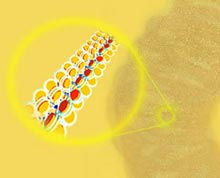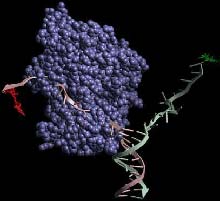
The first clinical trial to compare directly two of the most widely-used drugs in advanced lung cancer, cisplatinin and carboplatin (both in combination with paclitaxel) – have concluded that the older drug, cisplatin, is the better treatment.
Patients given cisplatin and paclitaxel had better survival rates and their quality of life was just as good as patients receiving carboplatin and paclitaxel.
The phase III multi-national European trial involving 618 patients with advanced non

A research team at two Midwest universities has developed a new way to genetically alter cells in living mice, offering new possibilities in the war against cancer and other diseases.
Using a modified virus as a Trojan horse, a team led by Purdue University’s David Sanders has found a promising system to deliver genes to diseased liver and brain cells. By placing helpful genetic material within the outer protein shell of Ross River Virus (RRV), Sanders’ team was able to alter the

Companies that create HIV-AIDS drugs now have key information that could assist in making new medications with fewer side effects.
Researchers Henry Weiner, a professor of biochemistry at Purdue University, Steven Zollo of the National Institute of Standards and Technology and Lauren Wood of the National Cancer Institute, noted the similarity between HIV-AIDS treatment side effects and naturally occurring diseases. Certain HIV-AIDS treatment side effects, such as fat loss and insulin resista

A team led by Terumi Kohwi-Shigematsu of Lawrence Berkeley National Laboratory’s Life Sciences Division has demonstrated that SATB1, a protein crucial to the development of the immune system, works by forming a network in the cell nucleus, attaching chromatin to the network structure at specific sites, and orchestrating remodeling of the chromatin over long distances to regulate gene expression.
“SATB1 determines when and how the genes are read — when they are activated and when they are

Using an optical fluorescence microscope to monitor enzyme activity, researchers at three universities have solved a long-running mystery. It takes at least two proteins, working in an unstable tandem, to unzip two strands of DNA.
Their newly designed approach, which focuses on the activity of single molecules, also showed — for the first time — that if one protein falls away, the process stops. Unless another climbs aboard, DNA reverts to its zipped state.
The technique, which o

Ribosome Recycling Factor Mimics Shape, But Not The Functions of Transfer RNA
RRF Protein Offers Potential Target for New Antibiotics
The fact that ribosome recycling factor (RRF) looks a lot like transfer RNA (tRNA) has not been lost on scientists. After all, both molecules are an important part of a bacteria’s ability to create new proteins. Researchers at the University of Pennsylvania School of Medicine and the University of Southern California, Santa Cruz, however, hav

– new calculation confirms standard model of particle physics. Contribution of hadronic vacuum polarization determined with unprecedented accuracy. The magnetic moment of the muon is an important precision parameter for…
Technique may prevent formation of unwanted waves that siphon off needed energy. Heating plasma to the ultra-high temperatures needed for fusion reactions requires more than turning the dial on a…

An international team of astronomers, led by researchers from the Astronomical Observatory of the University of Warsaw, have identified a new class of cosmic X-ray sources. The findings have been…

How deubiquitinases USP53 and USP54 cleave long polyubiquitin chains and how the former is linked to liver disease in children. Deubiquitinases (DUBs) are enzymes used by cells to trim protein…

Conceptual blueprint to analyze experimental catalyst data. Machine learning (ML) models have recently become popular in the field of heterogeneous catalyst design. The inherent complexity of the interactions between catalyst…

Antibody that Neutralizes Inhibitory Factors Involved in Nerve Regeneration Leads to Enhanced Motor Function after Acute Spinal Cord Injury. Researchers at 13 clinics in Germany, Switzerland, the Czech Republic and…

How simulations help manufacturing of modern displays. Modern materials must be recyclable and sustainable. Consumer electronics is no exception, with organic light-emitting diodes (OLEDs) taking over modern televisions and portable…

“Neurons that fire together, wire together” describes the neural plasticity seen in human brains, but neurons grown in a dish don’t seem to follow these rules. Neurons that are cultured…

The quest for sustainable energy solutions has been a major focus of scientific research for decades. Solar energy, a clean and renewable source, has emerged as a promising alternative to…

With a processing speed a billion times faster than nature, chip-based laser neuron could help advance AI tasks such as pattern recognition and sequence prediction. Researchers have developed a laser-based…

New technology could remotely identify various types of plastics, offering a valuable tool for future monitoring and analysis of oceanic plastic pollution. Researchers have developed a new hyperspectral Raman imaging…

Artificial Intelligence (AI) has established a strong presence across industries, large and small. The “VoBaKI” research project has empowered small and medium-sized enterprises (SMEs) with an innovative tool to independently…